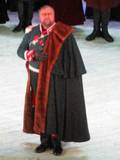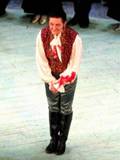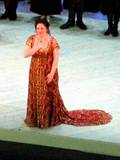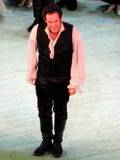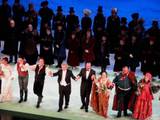It's now a while since I went to see this. I did a brief review after my first attendance, and intended to do more, which was rather stymied by Gerald Finley being not too well on the second night that I went.
In any case I wanted to say more than just an appraisal of the singers. However, I do think that Gerald was masterful. Vocally, on the first occasion only; dramatically on both occasions. He is a stupendous acting singer, and having now seen him in two different productions he is, for me, the definitive Eugene Onegin. Not that I'm knocking Dmitri Hvorostovsky, far from it, but I do find that Dmitri in character is less compelling than Dmitri in concert.
I actually think that Eugene Onegin is a work of something approaching genius. The more I get to know it, the more I think that it would be an ideal introduction to opera for just about anybody. It has some amazing tunes in it, although conversely, there is nothing that I take away as an earworm, and, apart from Kuda, kuda, there is no tune that I conjure up at will.
The more I see it, the more the story affects me. A reflex action would be express frustration at the futility of the duel. Have a disagreement with your best mate, and the only way to resolve it is pistols at dawn. I am afraid it strikes at immature macho posturing.
Some people say that the opera should be called Tatiana. I am not convinced*, but I can see the thrust of the argument. In Act I, Tatiana is a dreamy, bookish teenager, easily enraptured by a romantic hero who rides into town in a pair of white breeches. By the end, she is expressing her happiness at being married to Prince Gremin, who is considerably older and not especially dashing or glamorous. I happen to find that very romantic and simultaneously realistic. It's okay to have your dreams and romantic notions when you are young, but as you mature you throw off such superficial notions. Indeed, that it was both Mother and Nurse tried to impress upon Tatiana in the early act.
I think that Gremin's aria is one of the most romantic in all of opera (special praise to Hans Peter Konig in this production). It is enduringly simple, and reflects that, although he maybe called 'Prince', he is an uncomplicated and sincere man, and I believe that Tatiana's marriage with him is enduringly happy because of this. Perhaps I am betraying my essential bourgeois nature, perhaps I ought to be making more of a case for dashing, Romantic, fucked-up up Onegin.
If the opera is about how Tatiana grows up and changes, it is even more about how Onegin fails to do. Above all, it's about him as an outsider. It is easy to be attracted to such an exotic figure if they are fictional, but throughout, he displays his own emotional autism. Some people think that at the end, he finally grows up when he realises that Tatiana won't have him, but I don't think he does. Intellectually, he realises that he was a fool to have turned her down way back then, but I don't think he fully grasps why Tatiana makes a positive choice to be with Gremin.
I think the music is unbelievably gorgeous. I find it difficult to identify my favourite piece, but I think the set pieces for the chorus are rather special. It would be wrong to ignore Tatiana's Letter Scene, a tour de force for the soprano in question. I love Lensky's aria and Gremin's aria, too. Which leaves us with Onegin himself. Bizarrely, I can't name an outstanding piece of music from him, but he is so dominant throughout it takes a special singer to do it justice.
Regarding the production, I have mixed feelings about it. I reject some of the criticism as ill-founded. For example, some people object that the dance for Tatiana's nameday is held in cramped provincial surroundings, well, it should be. I like the skating party for the Act III Polonnaise. Again, people have criticised it for its lack of authenticity. I can't say I am bothered by a slavish adherence to setting. It doesn't change the linear narrative and it looks good. I don't know for a fact whether the aristocracy of St Petersburg would actually have organised such a party at such a time, but I am prepared to accept is a possibility.
What I was more aware of in seeing it his year than two years ago was a fundamental contradiction. The programme notes discussed the essential intimacy of the work, saying that Tchaikovsky wanted to break away from the then current fashion of grandly staged spectaculars, and create what was essentially a domestic drama between ordinary characters. If it wasn't for that programme note, I probbaly wouldn't have spotted the essential absence of intimacy. Even when the famous Covent Garden box was utilised - for Tatiana's bedroom and for Gremlin's library - it ultimately became necessary to break out of the box in order fully to play the drama.
My abiding memory, at least of excursion 1, will be Gerald Finley's total portrayal of the character. I can't adequately describe the overall effect. It's not just that I love his voice, it's not just that I recognise a fine musician who seems to have an instinctive understanding of how to portray the music. He was inside the character, portraying the change from a rather aloof yet impetuous young man to one more worldly and experienced and yet still not comfortable in human relations. I don't know what it is he does, I couldn't really single out any particular example of how he used this device or move din such a way in order to illustrate a point. I suppose that's what is called acting!
I am already looking forward to seeing him as Dr Atomic next Spring at ENO, and I will also got to Die Tote Stadt at ROH, although, at this stage, not knowing the opera, I can't really feel very enthusiastic, except for him. Hopefully, I will remedy that in the interim.
Here are my rather pathetic curtain call photos.
If you want a host of decent photos, look here
* obviously, in my world, it would be called Vladimir Lensky

